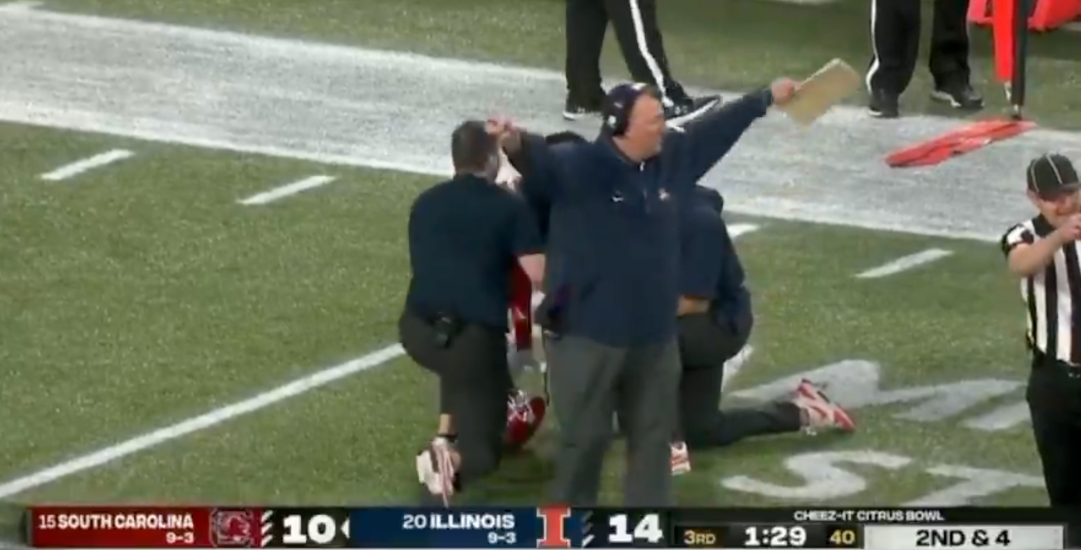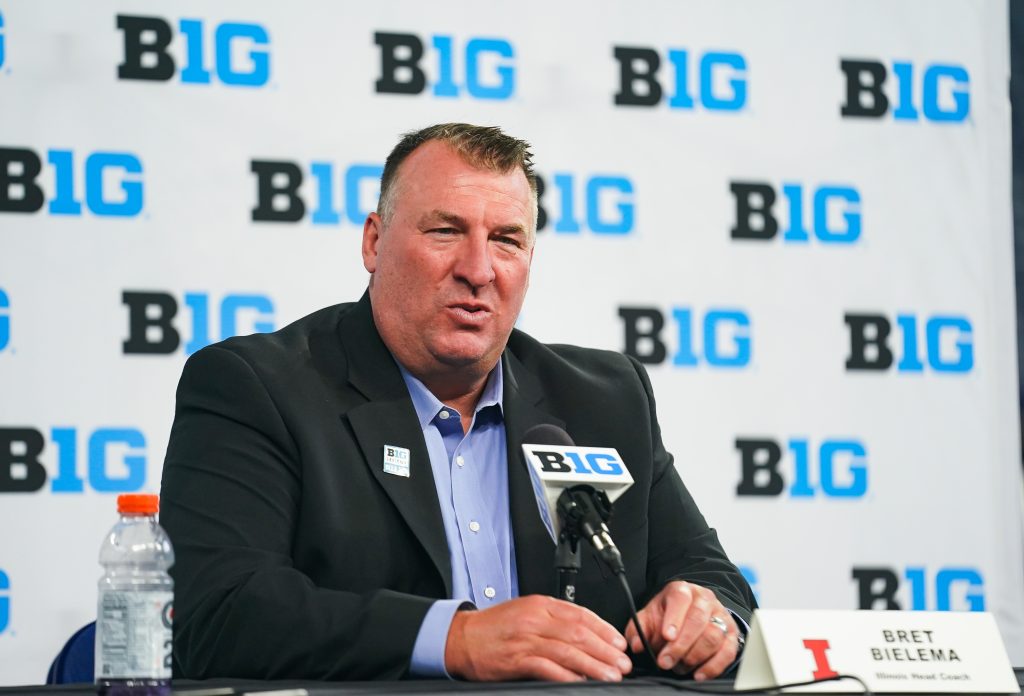Bret Bielema taunt has become a topic of discussion in the sports world, especially among college football enthusiasts. This incident involving the former University of Wisconsin head coach has sparked debates about sportsmanship and competitive spirit. In this article, we will delve deep into the details surrounding Bret Bielema's infamous taunt, exploring its context, impact, and the lessons it teaches us about the sports industry.
Bret Bielema's career in college football is marked by both achievements and controversies. Among these, the taunt incident stands out as one of the most memorable moments. It raises questions about the thin line between celebrating victories and disrespecting opponents. As we explore this topic, we aim to provide a comprehensive understanding of the event and its implications.
This article will not only focus on the incident itself but also examine the broader context of sportsmanship in athletics. By the end of this piece, readers will have a clearer perspective on the complexities surrounding competitive sports and the behavior of athletes and coaches alike.
Read also:Adrian Marcelo Desnudo Unveiling The Truth Behind The Controversy
Biography of Bret Bielema
Early Life and Education
Bret Bielema's journey in sports began long before he became a prominent figure in college football coaching. Born on June 29, 1960, in Whitewater, Wisconsin, Bielema grew up in a family that valued education and athletics equally. His passion for sports was evident from a young age, leading him to excel in various athletic competitions during his school years.
After completing high school, Bielema pursued higher education at the University of Wisconsin-Whitewater, where he played football. His dedication and performance on the field earned him recognition and set the stage for his future career in coaching.
Career Highlights
Bret Bielema's career as a football coach is a testament to his expertise and commitment to the sport. Below is a summary of his notable achievements:
- Served as the head coach of the University of Wisconsin football team from 2006 to 2012.
- Won three consecutive Big Ten championships (2010, 2011, and 2012).
- Known for developing strong defensive strategies and nurturing young talent.
- Received numerous accolades for his coaching abilities, including Big Ten Coach of the Year in 2010.
Bret Bielema's Personal Data
| Full Name | Bret Bielema |
|---|---|
| Date of Birth | June 29, 1960 |
| Place of Birth | Whitewater, Wisconsin |
| Education | University of Wisconsin-Whitewater |
| Profession | College Football Coach |
Understanding the Bret Bielema Taunt Incident
The infamous Bret Bielema taunt occurred during a pivotal moment in a college football game. This section will explore the details of the incident, its context, and the reactions it sparked among fans and critics alike.
What Happened During the Game?
In a closely contested game against a rival team, Bret Bielema's actions drew attention when he engaged in behavior that many perceived as unsportsmanlike. While celebrating a key play, Bielema made gestures that were interpreted as taunting the opposing team. This incident quickly became a talking point in the sports community.
Reactions from Fans and Critics
Fans of both teams had differing opinions about Bielema's actions. Supporters of his team defended his behavior as a celebration of victory, while opponents viewed it as disrespectful. Critics argued that such actions undermine the principles of sportsmanship and set a poor example for young athletes.
Read also:Cody Jinks Wife A Comprehensive Look Into Her Life And Influence
Impact on Bielema's Career
The taunt incident had long-lasting effects on Bret Bielema's reputation in the sports world. While it did not significantly impact his career trajectory, it highlighted the importance of maintaining professionalism and respect in competitive environments. Bielema's subsequent moves and decisions were often scrutinized in light of this event.
Exploring the Concept of Sportsmanship
Sportsmanship is a fundamental aspect of athletics, emphasizing respect, fairness, and integrity. This section examines how the Bret Bielema taunt incident fits into the broader conversation about sportsmanship in college football.
Defining Sportsmanship
Sportsmanship involves adhering to the rules of the game while maintaining respect for opponents, teammates, and officials. It encourages athletes and coaches to exhibit grace in victory and defeat, fostering a positive environment for competition.
Challenges in Upholding Sportsmanship
Despite its importance, upholding sportsmanship can be challenging in high-pressure situations. The desire to win and the intensity of competition sometimes lead to behaviors that cross the line into unsportsmanlike conduct. The Bret Bielema taunt incident serves as a case study for understanding these challenges.
Statistical Analysis of Controversial Moments in Sports
Data and statistics can provide valuable insights into the frequency and impact of controversial moments in sports. Below are some key findings:
- According to a study by Sports Psychology Today, approximately 15% of college football games involve incidents of unsportsmanlike conduct.
- Teams with a history of such incidents often face stricter scrutiny and penalties from governing bodies.
- Public perception of such events can significantly influence a coach's or player's reputation, affecting their career prospects.
Lessons Learned from the Incident
The Bret Bielema taunt incident offers valuable lessons for athletes, coaches, and fans alike. This section highlights the key takeaways from this event.
Importance of Professionalism
Maintaining professionalism is crucial in competitive sports. Athletes and coaches must strike a balance between celebrating achievements and respecting opponents. This ensures that the spirit of the game remains intact and sets a positive example for aspiring athletes.
Role of Leadership in Sports
Coaches like Bret Bielema play a pivotal role in shaping the culture of their teams. Their actions, both on and off the field, influence the behavior of players and set the tone for the team's reputation. Leadership in sports extends beyond tactical decisions and encompasses ethical considerations.
How the Incident Shaped Future Policies
In response to incidents like the Bret Bielema taunt, governing bodies in sports have implemented stricter policies to promote sportsmanship. This section explores these changes and their impact on the sports industry.
Updated Regulations and Penalties
Sports organizations have introduced new regulations to address unsportsmanlike conduct. These include stricter penalties for taunting, celebrations that cross the line, and other forms of disrespectful behavior. The aim is to create a fair and respectful environment for all participants.
Education and Awareness Programs
Efforts are being made to educate athletes and coaches about the importance of sportsmanship. Workshops, seminars, and online resources are available to promote ethical behavior in sports. These initiatives aim to foster a culture of respect and integrity in athletics.
Comparing Similar Incidents in Sports History
The Bret Bielema taunt incident is not unique in the world of sports. This section compares it to other notable moments in sports history where sportsmanship was called into question.
Famous Taunts in Sports
Throughout sports history, there have been several instances of taunting that sparked controversy. Examples include Muhammad Ali's famous "rope-a-dope" technique and LeBron James' celebration during the 2012 NBA Finals. These moments highlight the fine line between confidence and arrogance in sports.
Public Reaction and Media Coverage
The media plays a significant role in shaping public perception of such incidents. In the case of Bret Bielema, media coverage amplified the discussion about sportsmanship and its relevance in modern sports. Understanding the media's influence is crucial for athletes and coaches navigating the public eye.
Expert Opinions on the Incident
Experts in sports psychology and ethics provide valuable insights into the Bret Bielema taunt incident. This section features opinions from renowned professionals in the field.
Analysis by Sports Psychologists
Sports psychologists emphasize the psychological impact of taunting on both the perpetrator and the victim. They argue that such behavior can lead to increased tension and hostility in sports environments, detracting from the overall experience.
Ethical Perspectives from Academics
Academics specializing in sports ethics offer a critical analysis of the incident, highlighting the need for ethical frameworks in athletics. They advocate for the integration of ethical considerations into sports education and training programs.
Conclusion
The Bret Bielema taunt incident serves as a reminder of the complexities surrounding sportsmanship in competitive environments. While it sparked debates and controversy, it also provided valuable lessons about the importance of professionalism and respect in athletics.
We invite readers to share their thoughts and opinions on this topic in the comments section below. Your feedback is essential in fostering meaningful discussions about sportsmanship and its role in shaping the future of sports. Additionally, explore other articles on our website for more insights into the world of sports and beyond.
Table of Contents
- Biography of Bret Bielema
- Early Life and Education
- Career Highlights
- Bret Bielema's Personal Data
- Understanding the Bret Bielema Taunt Incident
- What Happened During the Game?
- Reactions from Fans and Critics
- Impact on Bielema's Career
- Exploring the Concept of Sportsmanship
- Defining Sportsmanship
- Challenges in Upholding Sportsmanship
- Statistical Analysis of Controversial Moments in Sports
- Lessons Learned from the Incident
- Importance of Professionalism
- Role of Leadership in Sports
- How the Incident Shaped Future Policies
- Updated Regulations and Penalties
- Education and Awareness Programs
- Comparing Similar Incidents in Sports History
- Famous Taunts in Sports
- Public Reaction and Media Coverage
- Expert Opinions on the Incident
- Analysis by Sports Psychologists
- Ethical Perspectives from Academics
- Conclusion


